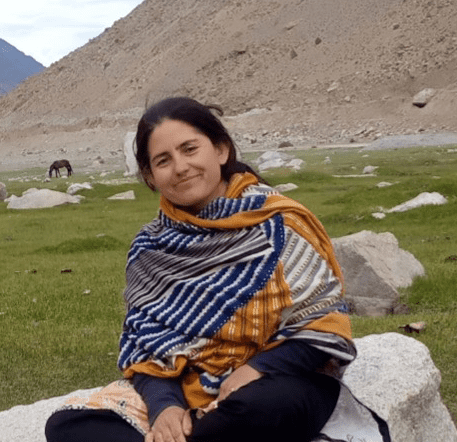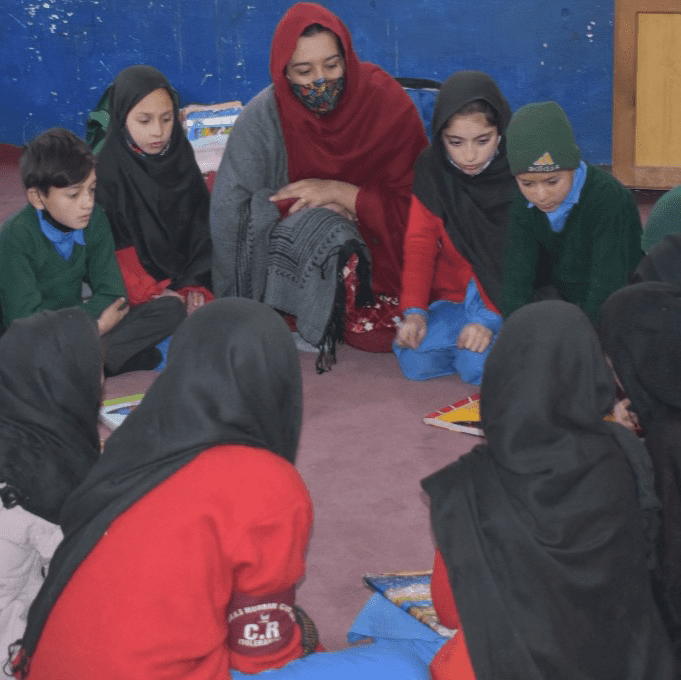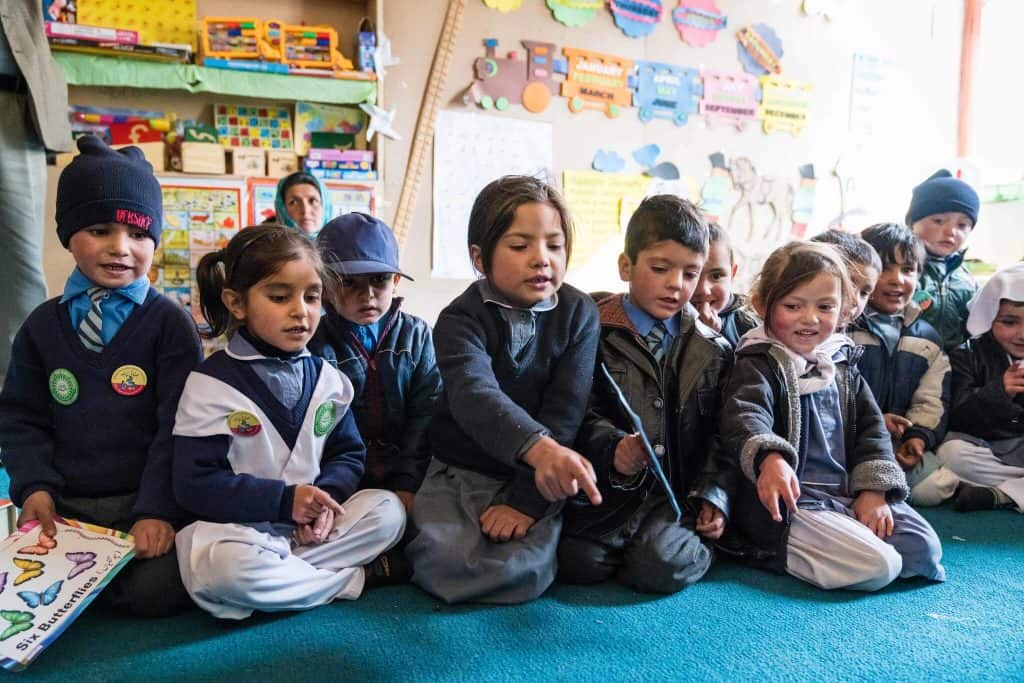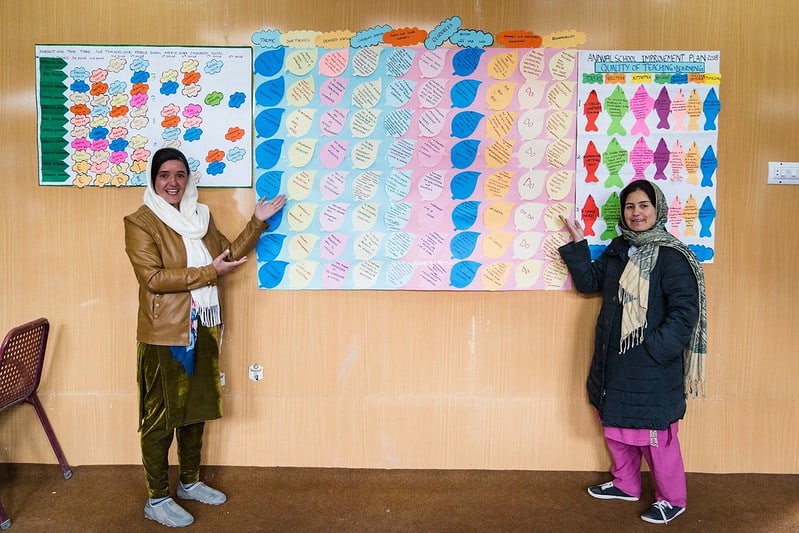
Bridging the gap – the story of Bibi Tawoos
My name is Bibi Tawoos and I have worked as a headteacher for 11 years at a Government Primary School in Shetmerg, a village in the Hunza valley, Pakistan. One of my favourite things about teaching is seeing the enthusiasm of the kids when they understand something – this makes them want to learn more from me. Unfortunately, the children’s home lives and environment are a big challenge for them – the area is very remote and it is also very harsh here in winter. The students often have poor living conditions and experience hard home lives as a result. All these issues can negatively impact their learning and quality of life in general.
Through my school’s involvement with Schools2030 I have been learning about the Human-Centred design (HCD) process – the experience has been very important for me. I have been able to use this process to work with students at a grass-roots level, learning about their surroundings and home environment. During the consultation (‘Explore’) phase, one thing shocked me that was that one of the children I interviewed was feeling very isolated and rejected by his family. In another case, when I interviewed one of the students, I realised that I had been unfamiliar with many things that the child was going through. It was emotional as I came to know more about his personal feelings. The experiences of these children have a direct impact on their learning, confidence and behaviour, so it is important to understand their situations.
Having the opportunity to consult with and conduct experimental research with students has been great and I felt very proud when I got feedback from the students. I was happy that they had accepted me and recognised me as their mentor.
Bibi tawoos, headteacher
This is why HCD is such a useful and surprising tool – it is the first time I have worked on these non-academic areas for students. The approach is totally different from other approaches as it requires us to work at community levels and on the holistic development of the students. It also bridges the gaps between the students, teachers, and parents in a way that is hands-on.
Having the opportunity to consult with and conduct experimental research with students has been great and I felt very proud when I got feedback from the students. I was happy that they had accepted me and recognised me as their mentor. After the HCD cycles, they were found to be more connected and attached to me.

The HCD workshops have also provided an opportunity to connect with the families and friends of my students. We regularly meet with parents and families on academic and nonacademic matters. Due to these meetings, their trust in us has increased and they respect our profession more. They also feel more at ease discussing their problems with us.
The biggest takeaway from the process for me is that change is slow and process-oriented. It needs patience and continuous effort. Moreover, working with marginalised students and their families is not an easy task – motivation is a big issue for them. They need continuous follow-up and push to move ahead. But that is my role and I know that if I am motivated, then I can motivate them to work with me.

A newfound empathy – the story of Safid Gul
My name is Safid Gul, and I am a Primary School Teacher in Government Girls’ Primary School Murdan in Lower Chitral. I have been teaching for eight years: five years in this school and three in a school run by the Aga Khan Education Services (AKES). As a teacher, I aim to create a supportive classroom and develop a positive relationship with my students so they feel safe to express themselves – if they openly share their issues with me and we work together to achieve good results, I am so pleased. I always try to design interesting activities for the student so that they come to school happily and enjoy their school hours.
The biggest challenges I have faced are in improving the learning outcomes of the slow learners who need much more time and support from me, which can be difficult to give when so many students need attention. I also know that many students travel far on foot to get to school and have many domestic chores to attend to at home, which impacts their learning.
The HCD trainings we have received through Schools2030 have provided me with a different lens through which to identify student challenges and design appropriate solutions – it has centralised their interests and experiences and has made me empathise with them more. It is really a unique process and. I am really impressed.
The interview process was excellent and beautiful. When I interviewed students, they shared with me things that I had never known or realised before – some things I think they may not even share with their parents. Before I had blamed students for not learning, but I was ignorant of their issues, like family conflicts, economic challenges at home, etc. As a result, I realised that many factors are at play that can have an to influence on their learning. As a result, I am trying my best to address their issues, some of which are very sensitive, and I need to engage my school head for support. To ensure that I could trust my findings, I would cross-reference the students interviews with those of their parents and found that indeed the students had been honest in sharing with me, which was very encouraging.
The HCD trainings we have received through Schools2030 have provided me with a different lens through which to identify student challenges and design appropriate solutions – it has centralised their interests and experiences and has made me empathise with them more.
safid gul, primary school teacher
The solution I have developed is designed to improve English text reading at the primary school level through storybook reading. This was something I had previously been involved with through AKF’s School Improvement Programme but now with the Assessment and HCD tools and training, I am able to gather evidence on whether the idea can improve student outcomes.
It is also important to involve parents, so I held a meeting with parents and discussed the importance of reading with them. I encouraged them to give at least ten minutes to their children for story-reading every day and to discuss the stories with their children, as well as encourage their children to tell stories of their own. The parents are now engaged, and more gatherings will be held with them in the coming days. I am closely monitoring students’ progress. I see a significant improvement in student English text reading skills. It is my belief that by encouraging parents in this way, it will not only improve the child’s literacy, but also nurture important family bonds.

I have really enjoyed learning about the HCD process which is a new and fantastic experience to be part of it. It has been different to other trainings I have attended, much more systematic and we were able to document each stage of the process – from problem identification to the designing prototype and solutions. Exploring students’ personal issues has been very challenging, but it has changed my perspective and made me empathise with them more. Through the interview process, my trust in my students has increased – as well as theirs in me – and my attitude and relationship with them has been transformed.

Taking a holistic approach – the story of Rukhsana Munir
My name is Rukhsana Munir and I work as a primary school teacher at Government Girls’ Primary School What, Garam Chashma, in Chitral, Pakistan. I have been teaching since 2018. I enjoy being around my students very much. At their age, they are still full of the innocence of youth. When I feel stressed, their childlike perspectives and some of the funny things they say bring me such joy!
One of the biggest challenges we face here is getting parents to be meaningfully involved with their children’s learning. Parental involvement is so important for better outcomes for the students, and so when this is lacking, it can be very challenging for teachers. This is often not the fault of the parents, who face issues of their own – dealing with hard domestic or agricultural work, the problems of low income, family issues and more. I have realised that we need to understand the issues they face and offer better support to the community to ensure parents can be more involved in their children’s learning process.
This is one of the great things about the Human-Centred Design (HCD) approach, which was totally new to me – it allows us to take a holistic view of our students and the whole community. Before this, we were not looking through a human-centred lens or looking at all the various factors – home life, mental and physical health, wellbeing etc – that can impact student learning. HCD gives us the opportunity to systematically explore our students’ needs, desires, interests and motivations before designing any solutions. Before this, I was only looking at their cognitive development. I find myself more empathetic towards my students as a result of taking this holistic view.
Conducting interviews was also new to me and so it was quite challenging. I found that many students initially were not keen to share their feelings openly with teachers. Gradually, however, I developed a better relationship with them, and they began to share more openly. This sort of trusting relationship is so important – it strengthens the bonds between us and allows me to understand their concerns and fears so that I can take steps to address them.
I believe I am not just a teacher now, but a researcher, a designer and a leader too!
Rukhsana Munir, primary school teacher
This is the integrated, holistic approach that HCD allows – looking at wellbeing and all contributing factors to improve student outcomes. To me, it is inspiring. The HCD approach and student interview results made me firmly want to be a campaigner for students’ holistic development. I now can see that it is so easy to integrate holistic domains and non-academic skills into our daily practices. I am also working to ensure more parental involvement, engaging parents through HCD as partners in their children’s learning process. I conduct awareness sessions and have regular meetings with them.
HCD has really made me think that we teachers are also designers. My colleagues and I have worked to co-create ideas and they have given me a lot of help and support to develop my innovation which focuses on using a print-rich environment to improve student Urdu skills, which was a new idea for me. A print-rich environment immerses the children in many examples of reading materials – posters, word cards, books and other items that can help them to comprehend the value and meaning of the words and sentences they learn. Before, I had only focused on their phonic awareness, but during one of the HCD sessions, I came to see the value of the print-rich environment as well. Now I am working with my colleagues to develop and procure suitable materials that can enhance students’ skills in Urdu. I will continue to iterate and refine my idea to make it interesting for the students.
We need to teach 21st Century skills to our students and I believe that Schools2030 can help us in this regard, since it also provides a wonderful opportunity for teachers to influence education policies – if our ideas can be shown to effective for improving student outcomes it can be replicated and scaled to other schools and areas.
I am really pleased with my experience with HCD – I now have hands-on experience of problem-solving with the students and wider community and designing solutions that are practical and relevant for addressing their holistic needs. I believe I am not just a teacher now, but a researcher, a designer and a leader too!
